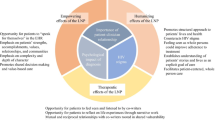Abstract
The University of Wisconsin–Madison Pediatric Pulmonary Center (UW PPC) provides interdisciplinary leadership training for graduate students and postgraduate professionals. The training includes a three-credit on-line course entitled Interdisciplinary Care of Children with Special Health Care Needs. This paper describes the course, the content and organization of which was guided by the life course perspective (LCP). The UW PPC team used the LCP to guide course organization, content development, and evaluation approaches. UW PPC trainees took responsibility for content areas, performed literature reviews and reviews of resources, and suggested student activities. Course content was focused on the child with special health care needs (CSHCN) embedded in contextual environments of family, community, culture, and larger social and public policy arenas. The content included three case-study videos that followed a child with cystic fibrosis from birth to age 18. Key concepts of the LCP were woven in throughout the videos and other course materials. Emphasis was on representing development of the individual during critical/sensitive periods and on social determinants of health. At semester’s end, qualitative and quantitative student evaluation results were very positive for all areas of the course. The final course paper, organized similarly to course modules, synthesized all aspects of the course. A successful paper included LCP concepts woven throughout to show integration of course content. The LCP provided a useful framework for course organization and content, and served as a lens through which students came to understand the care needs of CSHCN and their families. A course such as this can serve the important goal of educating future maternal child health professionals in using the LCP to understand how multiple determinants of health interact across the life span to produce health outcomes in this population.

Similar content being viewed by others
References
Fine, A., & Kotelchuck, M. (2010). Rethinking MCH: The life course model as an organizing framework. Washington, DC: US Department of Health and Human Services Health Resources and Services Administration, Maternal and Child Health Bureau.
Stein, R. E., & Jessop, D. J. (1989). What diagnosis does not tell: The case for a noncategorical approach to chronic illness in childhood. Social Science Medicine, 29(6), 769–778.
Halfon, N., & Hochstein, M. (2002). Life course health development: An integrated framework for developing health, policy, and research. Milbank Quarterly, 80(3), 433–479.
Gwatkin, D., Wagstaff, A., & Yazbeck, A. (2005). What works, what doesn’t, and why. Reaching the poor with health, nutrition, and population services. Washington, DC: World Bank.
Bronfenbrenner, U. (1979). The ecology of human development. Cambridge, MA: Harvard University Press.
Wagner, E. H. (1998). Chronic disease management: What will it take to improve care for chronic illness? Effective Clinical Practice, 1, 2–4.
The Women’s and Children’s Health Policy Center, Johns Hopkins Bloomberg School of Public Health. (2012). MCH Leadership Skills Development Series. Baltimore, MD. Accessed May 30, 2012, from http://www.jhsph.edu/wchpc/MCHLDS/index.html.
Pediatric Pulmonary Centers, Maternal and Child Health Bureau. (2012). Cross Cultural Health Care–Case Studies. Accessed May 30, 2012, from http://support.mchtraining.net/national_ccce/.
Georgetown University Center for Child and Human Development, Maternal and Child Health Bureau. The National Center for Cultural Competence. (2012). Accessed May 30 2012, from http://nccc.georgetown.edu/index.html.
Acknowledgments
Thank you to the UW PPC trainees who assisted with the development of the course, Deb Silvis, Tiara Muhr, Shanna Vander Galien, all of University of Wisconsin–Madison; the course lecturers, Lorraine Lathen (The Lifecourse Initiative for Healthy Families, Wisconsin Partnership Program and the University of Wisconsin School of Medicine and Public Health), Sharon Fleischfresser (Medical Director of the Wisconsin Department of Human Services Program for CYSHCN), Lisa Pugh, (Public Policy Coordinator for Wisconsin’s Disability Policy Partnership); and the actors in the case study videos: Mary Schroth (Department of Pediatrics, University of Wisconsin–Madison School of Medicine and Public Health, Mary Marcus, Craig Becker, Darci Pfeil, Rhonda Yngsdal-Krenz, Rose Hernandez, Kelly Cowan, Josh Salazar, Rebeca Liebl, Don Hawes, Kahnh Oberley (all of University of Wisconsin Hospital and Clinics). The redesign of the course and the preparation of this paper were supported by a training grant from the Maternal and Child Health Bureau, HRSA, DHHS (T72MC00008).
Author information
Authors and Affiliations
Corresponding author
Rights and permissions
About this article
Cite this article
Anderson, L.S., Schroth, M., Marcus, M. et al. The Development and Implementation of an Interdisciplinary On-Line Academic Course Using a Life Course Perspective. Matern Child Health J 18, 443–449 (2014). https://doi.org/10.1007/s10995-013-1282-1
Published:
Issue Date:
DOI: https://doi.org/10.1007/s10995-013-1282-1




